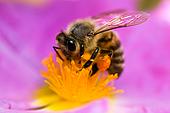
Making Stuff Smaller and Nano Bees to Treat Cancer ~ NOVA
Bee venom destroys cancer cells in tests By Ross Densley | 08/11/09 - 10:49

According to research done at Washington University in St Louis, bee venom is capable of being engineered to target tumours and cancer cells.
The study published in the Journal of Clinical Investigation details how the poisonous chemical melittin, found in bee stingers, was attached to 'nanoparticles' that were then used to attack and destroy cancer cells, leaving healthy cells intact. Dubbed 'nano-bees', these hybrid-particles were also effective in targeting pre-cancerous cells.
Professor Samuel Wickline who led the research hopes that the nano-bees could become a standard treatment in oncology, as it has fewer side effects than the likes of chemotherapy.
"The nano-bees fly in, land on the surface of cells and deposit their poisonous cargo."
The research was based on a series of tests done on two groups of mine that had cancerous tumors. One group of mice had melanoma skin cancer, whilst the other had been implanted with human breast cancer cells.
After four to five injections of the nano-bees, the breast-cancer tumors were 25 per cent smaller, and the melanoma tumors were 88 per cent smaller, compared with untreated mice. Despite the high toxicity of the bee venom, the mice suffered few side-effects and there appeared to be little damage to non-cancerous cells.
If the bee venom had been injected into the bloodstream in its normal form it would have lead to the destruction of red blood cells. However, following the injection of the modified nano-bees the blood count of mice was normal, and they showed no signs of organ damage.
"It's like molecular Velcro," Professor Wickline said. "The toxin doesn't come off the bee until it finds its target."
The team hopes to conduct human trials next year. ~ by NGP - Next Generation Pharmaceutical
